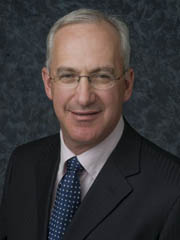Odette Cancer Program
SRI programs

Affiliate scientist
Sunnybrook Health Sciences Centre
2075 Bayview Ave., Room MG 408
Toronto, ON
M4N 3M5
Administrative Assistant: Suzanne Vasileff
Phone: 416-480-6100 ext. 64673
Email: suzanne.vasileff@sunnybrook.ca
Clinical ProfileShow/hide details
- Undergraduate: University of Toronto, biology, 1971 to 1973
- Medical training: University of Toronto, graduated 1977
- Residency: University of Toronto, Gallie program in surgery, completed in 1983
- Special Fellow in uro-oncology and tumour biology: Memorial Sloan Kettering Cancer Centre, New York, 1983-85
- Chief, division of urology, Sunnybrook
- Professor, department of surgery, University of Toronto
- Former Chair, Canadian Uro-Oncology Group and NCIC GU Site Group
- Chair, Global GU Oncology Group
- Treasurer, Society of Urologic Oncology
- Chairman, World Uro Oncology Federation
- Member, American Association of Genito Urinary Surgeons
- President, Canadian Urology Association
- Elected Honorary Member, American Urological Association
Research ProfileShow/hide details
Education:
- MD, 1977, University of Toronto, Canada
- FRCS(C), 1983
Awards:
- Urology Care Foundation’s Richard Williams Prostate Cancer Research Excellence Award, 2016
- Order of Canada, 2015
- Society of Urologic Oncology Medal, 2014
- Queen’s Jubilee Medal, 2013
- Honorary Member, American Urological Association, 2012
Appointments and Affiliations:
- Affiliate scientist, Biological Sciences, Odette Cancer Research Program, Sunnybrook Research Institute
- Incumbent, Sunnybrook Prostate Cancer Research Chair
- Chairman, World Urologic Oncology Federation
- Editor-in-chief (founding), Canadian Journal of Urology
- Editor emeritus, (founding), Canadian Urology Association Journal
- Honourary member of board, Prostate Cancer Canada
- Past president, Urologic Research Society
Research Foci:
- Micronutrients
- Prostate cancer prevention
- Active surveillance
Research Summary:
Prostate cancer, the most common human internal malignancy and the second most common cause of death in men, is likely highly preventable. The evidence for this is the 100-fold variation in incidence and mortality between races and regions, which is thought to be due, in part, to differences in dietary micronutrients. Dr. Klotz's laboratory has been studying the effect of selected micronutrients—particularly capsaicin, metformin and several isoflavanoids—in the prevention of prostate cancer. In a preclinical model, which spontaneously develops prostate cancer by eight months of age, his team has demonstrated that supplementing food with these micronutrients results in a dramatic and profound reduction in the development of these cancers. The major thrust of Dr. Klotz's research is to analyze the mechanisms by which these cancers are prevented.
His team analyzes the effect of these antioxidants on gene expression and molecules, which regulate cell growth. They are also interested in the relationship between the androgen receptor, a critical component of prostate cancer biology, and the response to micronutrients.
These studies will provide a scientific basis for the use of chemoprevention agents in prostate cancer. They will also provide some insight into the interaction between these agents. The studies will provide evidence as to whether patients with pre-neoplastic lesions of the prostate (i.e., PIN) benefit from micronutrients. This will have direct implications for men interested in preventing prostate cancer, and will provide a theoretical basis for optimizing the timing of initiation of preventive agents.
Dr. Klotz also has a long interest in the conservative management of prostate cancer, and is the principal investigator on a number of clinical trials evaluating the role of various interventions and imaging studies in men on active surveillance.
Selected Publications:
See current publications list at PubMed.
Related News and Stories:
- "Bespoke" prostate cancer treatment: Genomics and imaging tools are cracking the tough nut of prostate cancer, exposing which patients are most likely to get worse, and where tumours might be concealed (from SRI Magazine, 2016)
- A tapestry of clinical trials: High-impact findings: greater effectiveness, more precision, less harm and cost-conscious—this is what the cancer care of tomorrow looks like, emerging from the clinical trials of today (from SRI Magazine, 2016)
- Long-term Follow-up Indicates Active Surveillance Safe: Individualized approach for favourable risk prostate cancer shown to be safe and feasible in a 10- to 15-year time frame (November 17, 2009)
- Canadian Cancer Society Researcher of the Month : Dr. Laurence Klotz (September 2009)
- Image-Guided Ultrasound Targets Cancer: SRI scientists pioneer new treatment for prostate cancer (September 15, 2008)
- Spring Up: Eleven SRI researchers are recognized by a quartet of funding bodies (June 3, 2008)
- Reigning in the Radical - Laurence Klotz goes on active surveillance: A feature from Research Report 2004–2006


